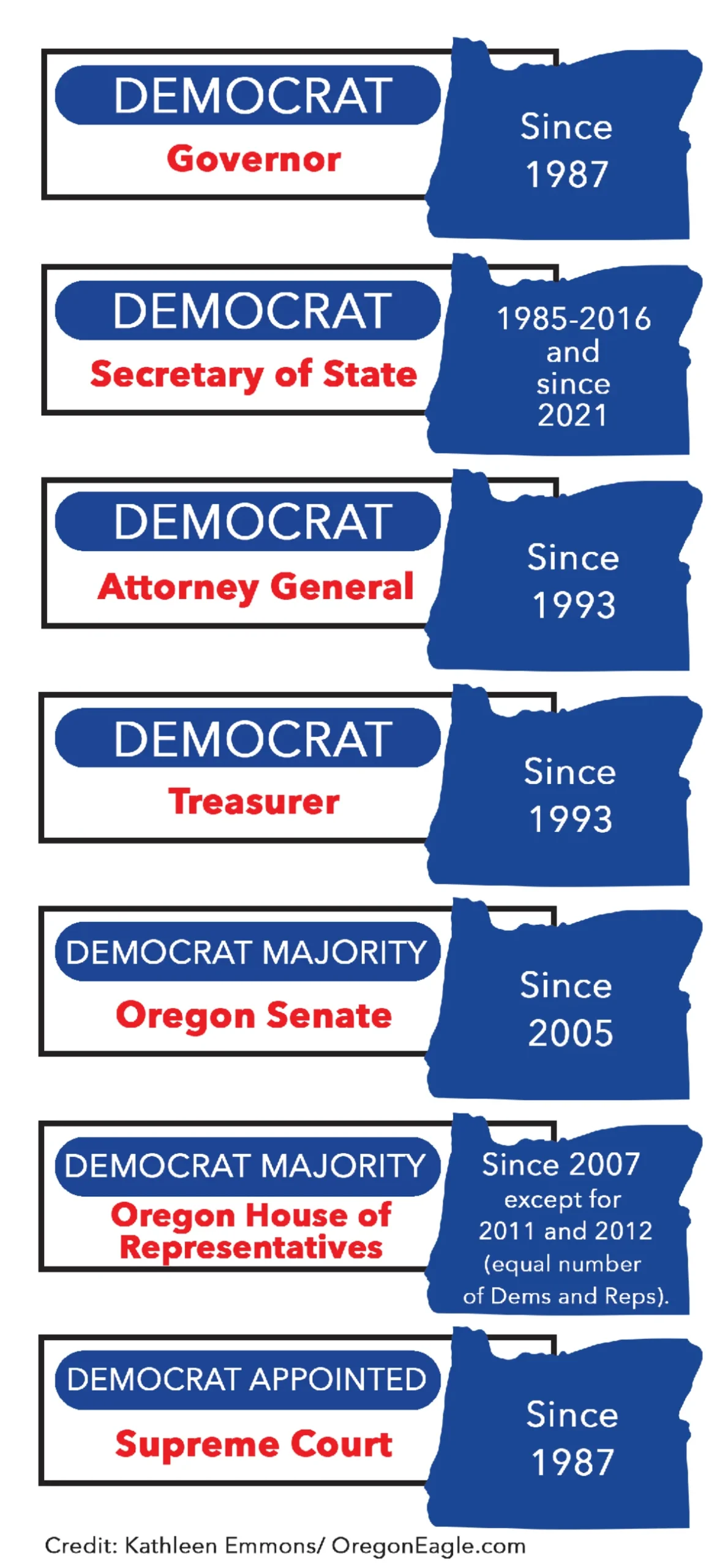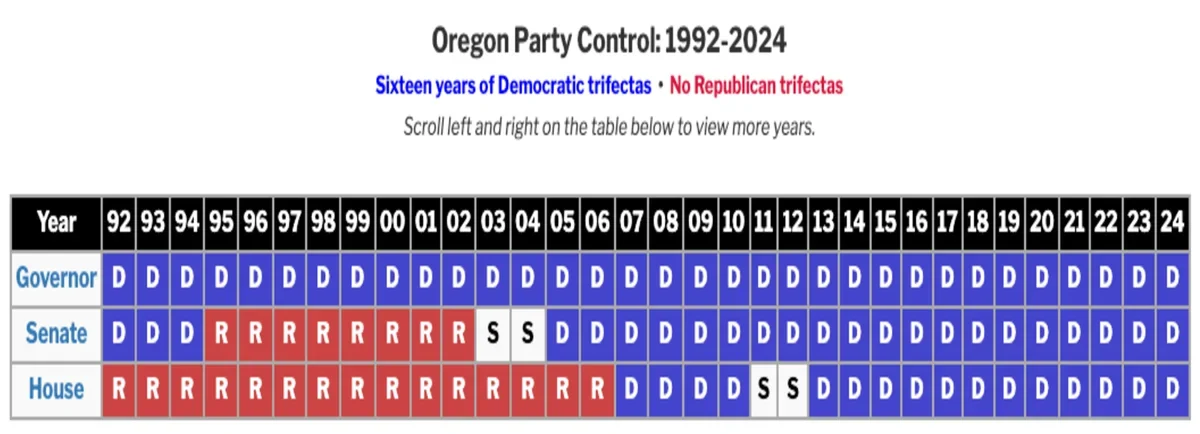Oregon hasn’t always had a lack of affordable housing, costly and poor-performing public schools, high taxes and heavy regulations on businesses, rampant drug addiction and homeless campers everywhere. Whom do you blame for all of this?
One way to answer the question is by reviewing who has been in charge of Oregon’s government.
A review of the past few decades shows an overwhelming dominance by members of the Democratic Party.
Oregon has had a Democrat Governor since 1987.
Oregon has had a Democrat Secretary of State since 1985, except from 2017 to 2020.
Oregon has had a Democrat Attorney General since 1993.
Oregon has had a Democrat Treasurer since 1993.
The Oregon Senate has been under Democratic control since 2005. Seventeen of 30 senators are Democrats.
The Oregon House of Representatives has been under Democratic control since 2007, except for 2011 and 2012 when there were an equal number of Democrats and Republicans. Thirty-five of 60 representatives are Democratic.
All seven justices of the Oregon Supreme Court were appointed by Democrat governors. Since 1987, all Supreme Court justices have been appointed by Democrat governors.

Statewide offices
Oregon’s last Republican governor was Victor Atiyeh who served from 1979 to 1986. Since 1987, all Oregon governors have been Democrats.
Oregon’s only Republican statewide office holder in the past 30 years was the late great Dennis Richardson who was elected secretary of state in 2016. He served until Feb. 26, 2019, when he passed away battling brain cancer.
The Oregon Legislature
In the Oregon House of Representatives and Oregon Senate, the majority party in each legislative chamber elects the presiding officer. Under the rules, no bill can get a hearing or a floor vote without the approval of the speaker of the House and the Senate president.
GOP Sen. Brian Boquist told the Eagle: “Senate rules require the presiding officer to approve every committee agenda and work session. The president can prevent any bill from getting a hearing or work session.”
Boquist added, “A separate Senate rule allows the president to hold any bill after committee passage indefinitely. He can simply hold it from a vote, period. It will never go to the floor for a full Senate vote.”
This is why a Republican-sponsored bill will never get a floor vote unless the Democrat presiding officer wants it to get a vote.
State Rep. Kevin Mannix represented the people of Salem-Keizer from 1989-2000 and again since 2023. During an interview on Sept. 10, The Oregon Eagle asked Rep. Mannix to comment on how the state legislature has changed over recent decades.
“It’s different, and it’s more of a burden to pass legislation. We have created our own legislative bureaucracy, and we’ve created rules that make it harder and harder to devise a bill, to amend the bill, to move a bill through the process.” Mannix indicated that the new process hampers legislators from presenting new ideas or calling additional hearings.
Mannix added, “The process that we’ve established works against a common sense, collegial approach, where you say, ‘Here’s the bill, let’s have a hearing to discuss the bill with witnesses about how you can make the bill better.”
“I think the opportunity for swift action has been lost, and the opportunity for dealing with substantive issues, which can be small but still substantive issues has been lost because of the bureaucracy.”
According to Mannix, legislators wanting to improve a bill late in the legislative session can be told, ‘Well, we can’t really consider that amendment because it hasn’t gone through legislative counsel, and even though this is the second to last day of the session, there won’t be time for them to work it up.’ To this Mannix responds, “Well actually you can. There was a time when we could literally write the changes in on the bill, and that, if you just reprint it with the changes, and that’s the bill.”
State government trifectas
A political trifecta occurs when one party controls the governorship and both chambers of the state legislature. Oregon is one of 17 states with a Democratic trifecta. There are 23 Republican trifectas currently, and 10 states have divided government. This is also known as single-party government.
Between 1992 and 2024, Oregon has had 16 years of Democratic trifectas and 16 years of divided government. There have been no years of a Republican trifecta. For two years, there were equal numbers of Republicans and Democrats.

Graphic source: https://ballotpedia.org/Oregon_State_Senate_elections,_2024
Oregon Supreme Court
In Oregon, Supreme Court justices are appointed by the governor when there is an opening on the seven-seat panel. Justices are elected to six-year terms. Of the seven Oregon Supreme Court justices, five are running for reelection on Nov. 5. The most recent midterm election was cancelled because there were no opponents.
Changing the make-up of the Oregon Supreme Court would require the election of a Republican governor in 2026 or thereafter.
‘Perils of a one-party state’
In the Oregonian’s Sept. 4, 2024, editorial, “The perils of a one-party state,” the editorial board criticized the handling of the Oregon Democratic Party‘s largest ever campaign donation of $500,000, received just before Gov. Tina Kotek’s election in 2022.
The editorial concluded, “But this case shows, at the very least, a casual attitude toward campaign finance compliance and an arrogance by leaders about conflicts of interest. Republicans often complain about the lack of accountability in our ‘one-party state,’ where Democrats hold all five statewide offices. The poor decisions throughout this case bolster their argument.
“Starting in 2027, new campaign contribution limits are to go in effect. Oregon’s ability to credibly enact and enforce those limits will depend on creating a culture where election laws are treated with the seriousness they deserve.”
What can be done?
The simple answer is elect more Republicans to statewide and legislative offices.
That’s easy to say for Republican and limited-government independent voters. For moderate and non-progressive Democrats, election time offers the opportunity to consider the results of one-party rule and act accordingly. Single-party rule hasn’t worked out well in California. Oregon’s problems call for more balanced leadership in Salem.
Richard Emmons is the Publisher and Editor of the Oregon Eagle.
Note: This article originally appeared in the October-November 2024 Oregon Eagle. This article may be republished online or in print provided full attribution is given.
